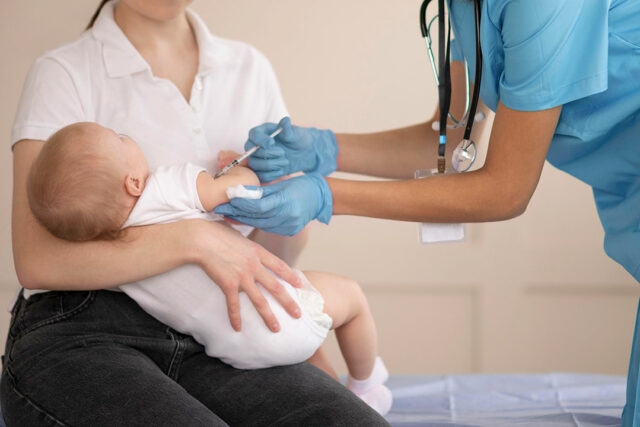
Medicine Cabinet
By Teodoro B. Padilla

The COVID-19 pandemic has had an unprecedented impact on healthcare services, particularly immunization programs. Recently, the World Health Organization and United Nations Children’s Fund released their joint report revealing the largest sustained decline in childhood vaccinations in approximately 30 years.
This unprecedented decline in immunization coverage was due to many factors including increased misinformation, and even disinformation, during the COVID-19 pandemic.
The Philippines was among several middle-income countries that recorded the highest numbers of children who missed out on one or more doses of diphtheria, tetanus, and pertussis (DTP) routine immunization in 2021. The DTP vaccination is a marker for immunization coverage within and across countries. From a high of 87% in 2014, the country’s immunization coverage among children dipped to 68% in 2019, and by 2022 was down to 62.9%. This is way below the national target coverage for routine immunization among children of 95%.
Apart from getting back on track to ensure more children are protected from preventable diseases, there is an urgent need to transition to “vaccination programs for all ages and all groups.” A life-course approach to immunization (LCI) is critical for future pandemic preparedness and health security, by providing additional protection against waning immunity and stemming the rise in mortality from vaccine-preventable diseases during adulthood.
This is why World Immunization Week, celebrated under this year’s theme of “The Big Catch-Up,” highlighted the collective action needed to promote the use of vaccines to protect people of all ages against diseases.
In support of The Big Catch-Up and in recognition of the vital role of media in delivering accurate public health information, the Philippine Press Institute (PPI), in partnership with the Pharmaceutical and Healthcare Association of the Philippines (PHAP) and member Pfizer Philippines, organized a seminar-workshop for journalists and patient organizations. Aptly titled “Injecting Hope,” the seminar-workshop was held in partnership with the Philippine Medical Association (PMA), Philippine Foundation for Vaccination (PFV), and Philippine Alliance for Patient Organizations (PAPO).
The seminar-workshop featured a distinguished panel of resource speakers from both the government and private sector that included infectious disease specialists, vaccine experts, policymakers, and patient leaders. It aimed to emphasize the need for urgent action to implement catch-up vaccination and promote life-course immunization to ensure the protection of people of all ages; and capacitate journalists and patient advocates to counter misinformation and boost vaccine confidence. It also sought to link journalists and patient leaders with government and medical experts as sources of credible information and highlight a whole-of-society approach to vaccination, to generate medically verified stories as reliable information resources for the public.
Among the speakers were Dr. Janis Bunoan Macazo, Department of Health (DoH) Program Manager for the National Program for Immunization; Undersecretary Odilon Luis Pasaraba, Undersecretary for Project Development Management of the Department of Interior and Local Government; and Dr. Mark Lawrence Tirao, Medical Officer of the Baguio City Health Services Office.
Also on the panel were Dr. Benito Atienza, immediate Past President of the PMA; Dr. Lourdes Carolina I. Dumlao, President of the Philippine Society of Geriatrics and Gerontology; Dr. Rontgene Solante, Chairman of Adult Infectious Diseases and Tropical Medicine, San Lazaro Hospital; and Dr. Artur Dessi Roman, Secretary of the Philippine Society for Microbiology and Infectious Diseases.
The second day of the seminar also had Fatima “Girlie” Lorenzo, Board Member of the PAPO; Dr. Lulu Bravo, Executive Director of the PFV; Rep. Ray Reyes of the Anakalusugan Party-list and vice-chairperson of the House Committee on Health, and Dr. Lani Buendia, Medical Officer V of the Quezon City National Immunization Program Medical Coordinator.
Also important to the forum were Undersecretary Enrique A. Tayag, head of the Field Implementation and Coordination Team, North & Central Luzon of the DoH; and Dr. Minerva Calimag, President of the PMA.
PPI Chairman Rolando Estabillo, Seminar Director Joyce Panares, Executive Director Ariel Sebellino, and Chito Maniago of Pfizer also delivered powerful messages, emphasizing the role of accurate reportage in helping the people make informed health decisions.
To recognize and honor the dedication of journalists, PHAP is working with PPI to confer a joint health award based on the proceedings of the Injecting Hope seminar-workshop. Through this award, it aims to encourage national and community journalists to write more stories about the value of life-course immunization. PHAP also recognizes the contributions of patient leaders in disseminating accurate health information and helping Filipino patients make informed health decisions.
Through their lessons from the Injecting Hope seminar-workshop, it hoped that journalists and patient leaders can help empower more Filipinos to get the recommended vaccines and, in the process, help save lives.
Teodoro B. Padilla is the executive director of Pharmaceutical and Healthcare Association of the Philippines (PHAP). PHAP represents the biopharmaceutical medicines and vaccines industry in the country. Its members are in the forefront of research and development efforts for COVID-19 and other diseases that affect Filipinos.